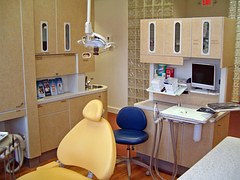A South Georgia elementary school has three dental chairs set up for kids who don’t have a regular dentist.
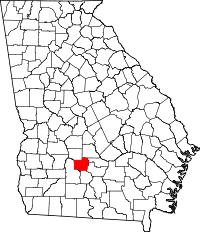
But those chairs at Turner County Elementary School in Ashburn have sat vacant for the past three years, even though many kids there need dental care, says Brenda Lee of Family Connection of Turner County.
That’s because Georgia doesn’t allow dental hygienists to practice in such a setting without a dentist present in the building. Only two other states — Alabama and Mississippi — have this same strict requirement.
Turner County officials had hoped to get hygienists to see kids for cleanings and fluoride treatment at the school, but current state law prevents it without a dentist on site.
That would change under a bill pre-filed Tuesday in the Georgia General Assembly. It would let hygienists practice in safety-net clinics, nursing homes, school-based clinics and other locations without a dentist present.
On Tuesday, the two powerful chairs of the Health and Human Services committees — one in the House and one in the Senate — spoke of the need for passage of the dental hygienist bill in the 2017 General Assembly, to help people who don’t have regular access to dental care.
But the legislation is expected to provoke a fierce battle with the Georgia Dental Association, which helped bottle up similar legislation in the House Rules Committee earlier this year.
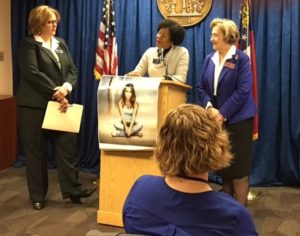
The proposal would help the most vulnerable – seniors, the disabled and children, said Sen. Renee Unterman (R-Buford), head of the Senate health panel. In Georgia, she said, “118 of 159 counties are considered dental health professional shortage areas.’’
Rep. Sharon Cooper (R-Marietta), who chairs the House panel, said there was “misinformation’’ that the previous proposal would allow dental hygienists to practice independently. That was never the case, she said, as a dentist would have to agree to authorize a hygienist to work in designated settings.
“I hope the right information gets out about the bill,” she said.
“A lot of younger dentists are in favor of the bill,’’ Cooper added. “We have trouble getting dentists going to our rural areas. This is a bill whose time has come.”
The legislation differs from the earlier version in that it would allow general supervision in private practice, Unterman said.
That means that dentists can be on sick leave or vacation and not have to close their practices, because hygienists could still see patients. “It’s common-sense legislation,” Unterman said.
“People can stay in place [in a nursing home] and at least get their teeth cleaned,’’ she added. “It’s a basic necessity in life.”
Earlier this year, a Georgia Tech researcher said hundreds of thousands of Georgia children have problems getting access to a dentist in the state.
Nicoleta Serban, an industrial and systems engineering professor, told state lawmakers that there are more than 500,000 Georgia children who are not eligible for the public insurance programs Medicaid and PeachCare, but whose parents cannot afford dental care.
In addition, Serban’s research indicated that more than 600,000 children eligible for those government programs need to travel further than state standards (30 miles in an urban area, 45 miles in a rural area ) to reach a dentist to serve them.
The need for dental care is also great for many Georgia seniors, according to supporters of the bill. Nearly one-third of older adults have untreated tooth decay. And poor oral hygiene is linked with stroke, pneumonia and periodontal diseases, says the Georgia Council on Aging.
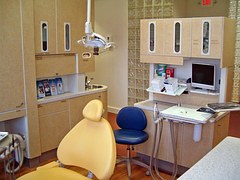
Vicki Johnson of the Council said Tuesday that if “a senior does not receive this preventive care, the consequences can be literally deadly. . . . It’s difficult for nursing home patients to see a dentist.”
Roughly 70,000 patients in long-term care facilities could benefit from the change, Johnson said.
The Georgia Dental Association on Tuesday said in a statement that it has not yet had an opportunity to review the proposed legislation.
”However, the association understands the concerns and shares the General Assembly’s goal to increase dental care for underserved and needy populations in Georgia,’’ the statement said.
“As part of our longstanding commitment to patient safety and improving oral health in the state, we look forward to continuing to work collaboratively with all parties, including Chairwomen Unterman and Cooper,” it continued.
The Dental Association said it would continue to pursue initiatives from its long-range plan to improve the oral health and overall health of all Georgians.
Meanwhile, hygienists noted in support of the bill that they are already allowed to clean teeth in Georgia public health departments without having a dentist present, if they are authorized by a supervising dentist.
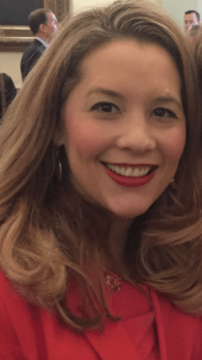
Misty Mattingly, a dental hygienist, told GHN on Tuesday that she expected another fight over the legislation. But she added she was confident the bill would pass.
Lee of Turner County said that filling the empty chairs would help many local children.
“We certainly hope this legislation will pass. It will really benefit our children and youth who don’t have dental care.”

